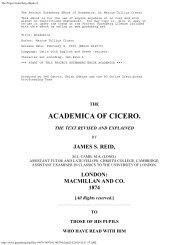From Farm House to the White House - 912 Freedom Library
From Farm House to the White House - 912 Freedom Library
From Farm House to the White House - 912 Freedom Library
You also want an ePaper? Increase the reach of your titles
YUMPU automatically turns print PDFs into web optimized ePapers that Google loves.
<strong>Farm</strong> <strong>House</strong> <strong>to</strong> <strong>the</strong> <strong>White</strong> <strong>House</strong>, by William M. Thayer 155<br />
"With some more practice <strong>the</strong>y will be," <strong>the</strong> commander replied modestly.<br />
"Have <strong>the</strong>y attained <strong>to</strong> this excellence of drill under your command?" General Putnam asked, noticing that <strong>the</strong><br />
officer could not be more than twenty years of age.<br />
"Yes, sir; I have enjoyed some opportunities <strong>to</strong> study military science."<br />
"Where?"<br />
"First in <strong>the</strong> West Indies, where I was born. I was a merchant's clerk <strong>the</strong>re, but longed for a military life, and<br />
finally I seized upon <strong>the</strong> first opportunity <strong>to</strong> study such books as I could find. After I came <strong>to</strong> this country my<br />
desire for military service did not abate, and I joined Captain Fleming's company."<br />
"General Washing<strong>to</strong>n must know you," responded Putnam as he moved on.<br />
We have introduced this incident here because <strong>the</strong> young commander was Alexander Hamil<strong>to</strong>n, who became<br />
identified with <strong>the</strong> his<strong>to</strong>ry of our country. He came <strong>to</strong> this country at fifteen; entered King's College, where he<br />
was <strong>the</strong> best scholar; joined one of <strong>the</strong> first volunteer companies organized in New York, and became so<br />
efficient that he was made captain of <strong>the</strong> artillery company he was drilling when General Putnam met him. He<br />
was not twenty years old at that time. Subsequently he became one of Washing<strong>to</strong>n's wisest counsellors. "In<br />
him were united," says ano<strong>the</strong>r, "<strong>the</strong> patriot, <strong>the</strong> soldier, <strong>the</strong> statesman, <strong>the</strong> jurist, <strong>the</strong> ora<strong>to</strong>r, and philosopher,<br />
and he was great in <strong>the</strong>m all."<br />
British ships of war continued <strong>to</strong> arrive, bringing Hessians and Scotch Highlanders <strong>to</strong> swell <strong>the</strong> king's army.<br />
Still no particular movement <strong>to</strong> capture <strong>the</strong> city was made.<br />
On <strong>the</strong> 21st of July, Washing<strong>to</strong>n heard from Sir Henry Clin<strong>to</strong>n's fleet. Clin<strong>to</strong>n left <strong>the</strong> British army in Bos<strong>to</strong>n,<br />
in December, 1775, and unexpectedly appeared in <strong>the</strong> harbor of New York, as we have stated. However, after<br />
a conference with Governor Tryon, he sailed south, saying that he had no intention of attacking New York.<br />
Clin<strong>to</strong>n soon appeared in Charles<strong>to</strong>n Harbor, part of an expedition against South Carolina, under Sir Peter<br />
Parker, and in a few days joined in attacking <strong>the</strong> fort, six miles below <strong>the</strong> city. The fort was commanded by<br />
Sir William Moultrie. It was attacked with both fleet and army, on <strong>the</strong> twenty-eighth day of June, by one of<br />
<strong>the</strong> most terrible bombardments ever known at that time. An experienced British officer said, "It was <strong>the</strong> most<br />
furious fire I ever heard or saw."<br />
A few days before, General Charles Lee advised abandoning <strong>the</strong> fort.<br />
"A mere slaughter-house!" he exclaimed <strong>to</strong> Governor Rutledge, who was a true patriot. "A mere<br />
slaughter-house! A British man-of-war will knock it <strong>to</strong> pieces in half an hour!"<br />
"Never<strong>the</strong>less, holding that fort is necessary <strong>to</strong> <strong>the</strong> defence of <strong>the</strong> city and State," answered Rutledge. "The<br />
fort must be held." He sent for Moultrie.<br />
"General Moultrie, what do you think about giving up <strong>the</strong> fort?" he inquired, repeating <strong>the</strong> advice of General<br />
Lee.<br />
Moultrie was indignant, and he replied:<br />
"No man, sir, can have a higher opinion of British ships and seamen than I have. But <strong>the</strong>re are o<strong>the</strong>rs who love<br />
<strong>the</strong> smell of gunpowder as well as <strong>the</strong>y do. Give us a plenty of powder and ball, sir, and let <strong>the</strong>m come on as<br />
soon as <strong>the</strong>y please."















